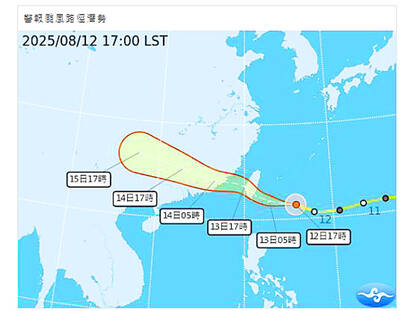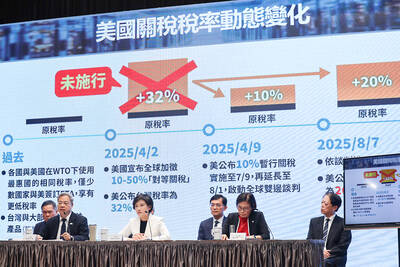Chinese authorities kept food safety concerns about a Shanghai dairy a secret for nearly a year before announcing last week that the company had been shut for producing tainted milk, an official said yesterday.
Shanghai Panda Dairy was shut down and put on a “black list” during the tainted milk scandal in 2008, in which at least six infants died and nearly 300,000 were made sick by milk products laced with melamine, a toxic chemical.
Its products were found to have the second-highest levels of melamine in the country, behind the now bankrupt Sanlu Group, the Shanghai Daily reported last week.
Authorities had allowed Panda Dairy to resume production, but it reused tainted condensed milk that had been recalled from the market, a spokesman for Shanghai prosecutors said.
Three executives could face trial as early as next month, prosecutors said: the general manager of Shanghai Panda Dairy and his two deputies.
“Illegally high” levels of melamine were found in the company’s powdered and condensed milk, the prosecutors’ spokesman said.
“We will file the case with the court in around half a month,” the spokesman said, asking not to be named because of the sensitivity of the case.
The three — who face charges of producing and selling toxic and hazardous food — could face trial before the end of next month.
He conceded that government inspectors had discovered the products contaminated with melamine, which gives the appearance of a higher protein content, months before Chinese media first reported the dairy’s closure last week.
“The case was uncovered quite early, actually,” the spokesman said.
“Quality supervision authorities found the problem in a February to April inspection. The case was then handed to the police in April and the related people were detained by the police in April,” he said.
He did not comment on why authorities waited so long to make the investigation public, but Chinese media have suggested the case was concealed out of fear that the revelations could damage China’s economic recovery.
A total of 21 people have been convicted for their roles in the 2008 melamine scandal. Two were executed, while a former Sanlu boss received life in prison.
China enacted a law early last year promising tougher penalties for makers of tainted food that also says authorities should immediately inform the public when food products have been found unsafe for consumption.
One other person was given a suspended death sentence, a punishment that is routinely commuted to life imprisonment, while 15 others were jailed for two to 15 years.
Sanlu, once one of China’s largest dairy manufacturers, went bankrupt last year after having amassed US$161 million in debt, Xinhua reported at the time.

GET TO SAFETY: Authorities were scrambling to evacuate nearly 700 people in Hualien County to prepare for overflow from a natural dam formed by a previous typhoon Typhoon Podul yesterday intensified and accelerated as it neared Taiwan, with the impact expected to be felt overnight, the Central Weather Administration (CWA) said, while the Directorate-General of Personnel Administration announced that schools and government offices in most areas of southern and eastern Taiwan would be closed today. The affected regions are Tainan, Kaohsiung and Chiayi City, and Yunlin, Chiayi, Pingtung, Hualien and Taitung counties, as well as the outlying Penghu County. As of 10pm last night, the storm was about 370km east-southeast of Taitung County, moving west-northwest at 27kph, CWA data showed. With a radius of 120km, Podul is carrying maximum sustained

Tropical Storm Podul strengthened into a typhoon at 8pm yesterday, the Central Weather Administration (CWA) said, with a sea warning to be issued late last night or early this morning. As of 8pm, the typhoon was 1,020km east of Oluanpi (鵝鑾鼻), Taiwan’s southernmost tip, moving west at 23kph. The storm carried maximum sustained winds of 119kph and gusts reaching 155kph, the CWA said. Based on the tropical storm’s trajectory, a land warning could be issued any time from midday today, it added. CWA forecaster Chang Chun-yao (張竣堯) said Podul is a fast-moving storm that is forecast to bring its heaviest rainfall and strongest

TRAJECTORY: The severe tropical storm is predicted to be closest to Taiwan on Wednesday and Thursday, and would influence the nation to varying degrees, a forecaster said The Central Weather Administration (CWA) yesterday said it would likely issue a sea warning for Tropical Storm Podul tomorrow morning and a land warning that evening at the earliest. CWA forecaster Lin Ting-yi (林定宜) said the severe tropical storm is predicted to be closest to Taiwan on Wednesday and Thursday. As of 2pm yesterday, the storm was moving west at 21kph and packing sustained winds of 108kph and gusts of up to 136.8kph, the CWA said. Lin said that the tropical storm was about 1,710km east of Oluanpi (鵝鑾鼻), Taiwan’s southernmost tip, with two possible trajectories over the next one

TALKS CONTINUE: Although an agreement has not been reached with Washington, lowering the tariff from 32 percent to 20 percent is still progress, the vice premier said Taiwan would strive for a better US tariff rate in negotiations, with the goal being not just lowering the current 20-percent tariff rate, but also securing an exemption from tariff stacking, Vice Premier Cheng Li-chiun (鄭麗君) said yesterday. Cheng made the remarks at a news conference at the Executive Yuan explaining the new US tariffs and the government’s plans for supporting affected industries. US President Donald Trump on July 31 announced a new tariff rate of 20 percent on Taiwan’s exports to the US starting on Thursday last week, and the Office of Trade Negotiations on Friday confirmed that it